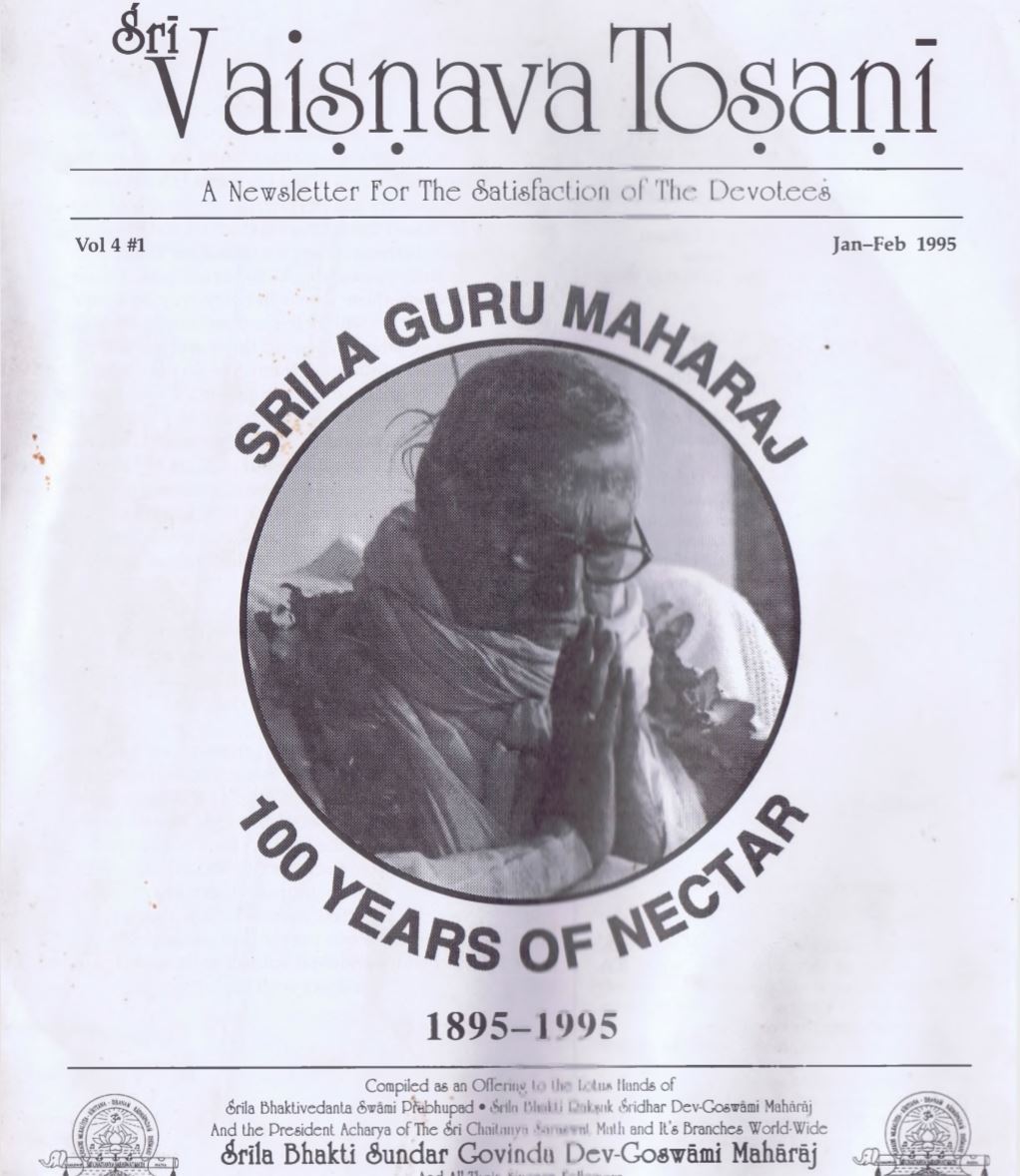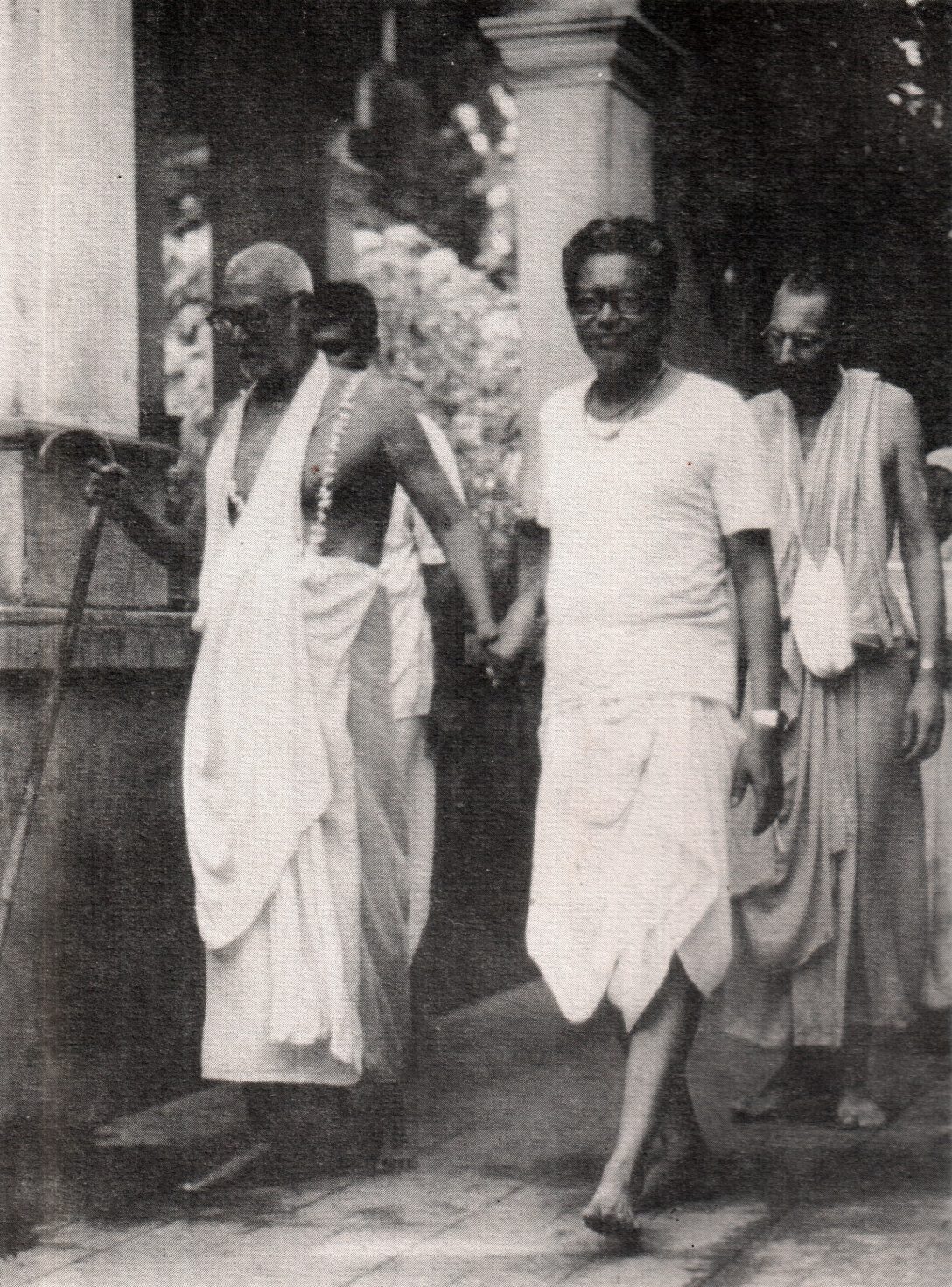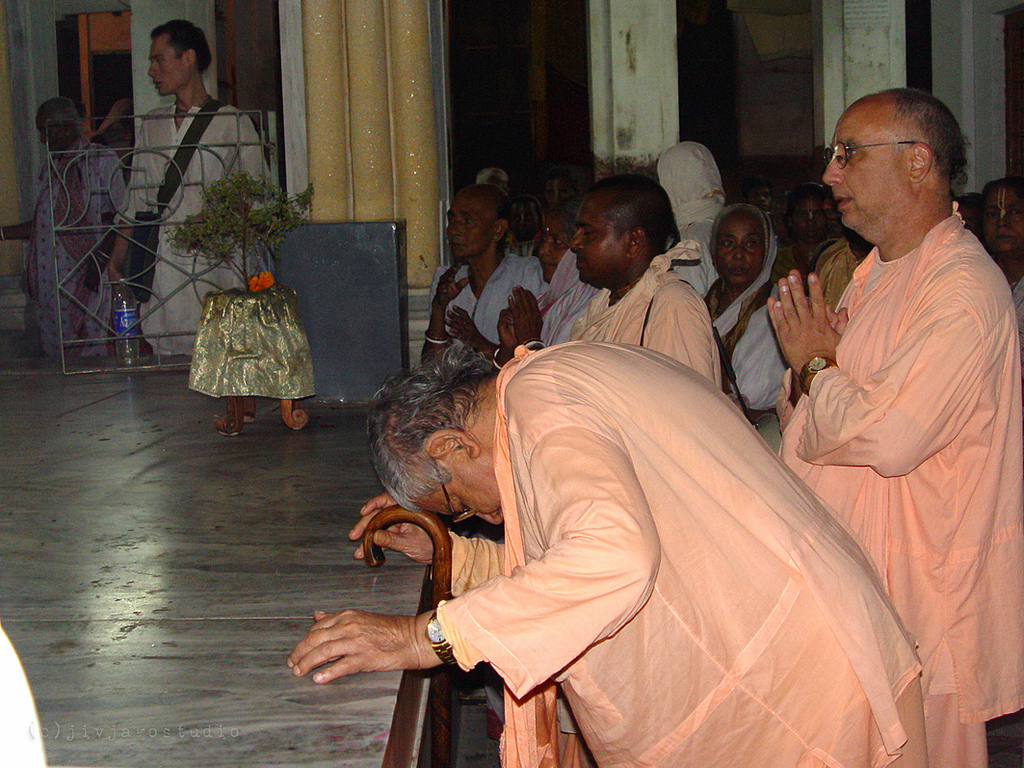Sri Vaishnava Toshani: Srila Guru Maharaj’s Centenary Edition, Jan–Feb 1995, Vol 4 #1 is presented here.
pdf file
Contents
Brahma Gayatri—The Ultimate Presentation
by His Divine Grace Bhakti Rakshak Sridhar Dev-Goswami Maharaj
The Perfect Guru
by His Divine Grace Bhakti Sundar Govinda Dev-Goswami Maharaj
A Glimpse Of Nectar
by Sripad B.A. Sagar Maharaj
How Could We Live Without Him?
by Sripad B.P. Janardan Maharaj
The Representative Of Sri Shukadev
by Sripad B.K. Giri Maharaj
A Glimpse Into His Divine Personality
by Sripad Yudhamanyu Das Seva Vikram
Relief In The Time Of Our Greatest Need
by Srimati Jivana Devi Dasi
Experiencing Unforgettable Mercy
by Srimati Kum Kum Devi Dasi
I Cannot Give A Certificate
by Sripad Srutrasrava Prabhu
Previous editions uploaded:
Jan–Feb 1992 Vol 1 No 1
March–April 1992 Vol 1 No 2
May–June 1992 Vol 1 No 3
Nov–Dec 1992, Vol 1 #6
May–June 1993, Vol 2 #2
Sept–Oct 1993, Vol 2 #3
Tag: Vaishnava
Hinduism & Vaisnavism
Srila Sridhar Maharaj discusses the progression from varnasram-dharma to Vaisnavism.
Download mp3 audio
You can find a complete and raw transcript of this talk here, which includes an illuminating discussion of tridanda-sannyas.
Devotee: This question of Hinduism and Muslim is coming up; we’re not Hindus but in some way we may speak on behalf of Hindus.
Śrīla Śrīdhar Mahārāj: We are not Hindus in the general sense. We are Vaiṣṇava [worshippers of Vishnu], we are Kāṛṣṇa [worshippers of Krishna]. Varṇāśram is steps to Vaiṣṇava-dharma, Vaiṣṇavism. It is a favourable step that may be utilised; we may begin from varṇāśram-dharma but we are to leave that when we enter the domain of nirguṇ. Varṇāśram is concerned with sattva-guṇa. It is up to sattva-guṇa, and then we are to leave varṇāśram when we enter into nirguṇ, Vaiṣṇavism proper.
Karma, our activities; the yoga, our attention; the jñāna, our dhyan, means our acquisition: when they leave their own colour and surrender into complete dedicated life, then it becomes Vaiṣṇavism. They have to leave their past steps. If all the karma is done only for the satisfaction of Kṛṣṇa then it is well and good, it is Vaiṣṇavism. And the jñāna, when it ceases all its enquiry, surrendering to the sweet will of Kṛṣṇa, then it is Vaiṣṇavism, it enters the realm of Vaiṣṇavism. And the yoga, the attention, the direction of our energy, internal, fine, subtle energy, when it stops seeking any other achievement but concentrates wholly for the satisfaction of Kṛṣṇa, then it enters the area of Vaiṣṇavism.
The karma and the jñāna and the yoga cannot give their promised result without the help of bhakti, without the support of the the universal wave or force. If God withdraws all His energy from them then they are nowhere. Just as there may be so many independent companies, insurance companies, banking companies, and such, but they can work as long as the government does not withdraw from them. If the government withdraws they cannot exist. But they can thrive, they can work well with the supposed backing of the government, with the passive support of the government. If the government is withdrawn, they are nowhere. If the power, the potency of Kṛṣṇa, the sympathy, is withdrawn, then karma, yoga, and jñāna are nowhere, but on the basis of the supposed support of the government, of Kṛṣṇa’s will, they can work on independently.
[kṛṣṇa-bhakti haya abhidheya-pradhāna]
bhakti-mukha-nirīkṣaka karma-yoga-jñāna
(Chaitanya-charitāmṛta, Madhya-līlā, 22.17)
[“Devotional service to Kṛṣṇa is the chief function of the living entity. There are different methods for the liberation of the conditioned soul—karma, jñāna, yoga and bhakti—but all are dependent on bhakti.”]
In Charitāmṛta, they are always looking at the face of bhakti, the service to Kṛṣṇa.
ei saba sādhanera ati tuchchha bala
[kṛṣṇa-bhakti vinā tāhā dite nāre phala]
(Chaitanya-charitāmṛta, Madhya-līlā, 22.18)
[“But for devotional service, all other methods for spiritual self-realization are weak and insignificant. Unless one comes to the devotional service of Lord Kṛṣṇa, jñāna and yoga cannot give the desired results.”]
What they give, that is a very negligible thing. Bhakti, service, does not depend on anything else. She can go independently, from any point. From any point of our life, only with the connection of a bona fide agent, we can link with bhakti and go on independently without taking any help from the energy [karma], from this fine attention [yoga], and our inquisitive spirit [jnana]. Everything may be rejected, and only through service, through a sādhu, one can go on safely towards Vaikuṇṭha.
In varṇāśram-dharma, or sanātan-dharma, there are the divisions of brāhmaṇ, kṣatriya, vaiśya, śūdra. The qualification of the brāhmaṇs, the highest section, is that they seek something which is not mundane, which is conscious; but they don’t have any clear conception of the conscious world, only some vague conception of the spiritual world. It is not very clear, so,
brāhmaṇānāṁ sahasrebhyaḥ satra-yājī viśiṣyate
[satra-yāji-sahasrebhyaḥ sarvva-vedānta-pāragaḥ
sarvva-vedānta-vit-koṭ yā viṣṇubhakto viśiṣyate
vaiṣṇavānāṁ sahasrebhyaḥ ekāntyeko viśiṣyate]
(Garuḍa-Purāṇa)
[“Among many thousands of brāhmaṇs, a yajñika brāhmaṇ is best. Among thousands of yajñika brāhmaṇs, one who fully knows Vedānta is best. Among millions of knowers of Vedānta, one who is a devotee of Viṣṇu is best. And among thousands of devotees of Viṣṇu, one who is an unalloyed Vaiṣṇava is best.”]
Satra-yāji means who is engaged in sacrifice which is meant to be following the model that everything should be done to satisfy Him, the central truth, Kṛṣṇa.
satra-yāji-sahasrebhyaḥ sarvva-vedānta-pāragaḥ
Then it may come to the stage of an enquirer, Vaidantic, who loves to deal with consciousness, fine things, Vedānta-pāragaḥ.
sarvva-vedānta-vit-koṭ yā viṣṇubhakto viśiṣyate
The yogī and the jñānī are stayed there; they are not dealing with gross things like karmīs but they are busy in their dealing with the very subtle things of consciousness. But mere consciousness does not mean God consciousness; there is consciousness of the self, consciousness of the cause of this material world, and so many things. Brāhmaṇs, who are the head of the varṇāśram-dharma, are more addicted to spirit than to matter, but they have not got the real and cosmic idea in the complete idea of this spiritual world, the purely spiritual world of Vaikuṇṭha or Goloka.
So the Vaiṣṇava,
bahūnāṁ janmanām ante, jñānavān māṁ prapadyate
[vāsudevaḥ sarvam iti, sa mahātmā sudurlabhaḥ]
(Bhagavad-gītā, 7.19)
[“After many, many births and deaths, one who is actually in knowledge surrenders unto Me, knowing Me to be the cause of all causes and all that is. Such a great soul is very rare.”]
When the jñānī surrenders to the feet of Vāsudeva then he becomes a Vaiṣṇava. The Vaiṣṇava is there. And when the karmī,
yajñārthāt karmaṇo ‘nyatra, loko ‘yaṁ karma-bandhanaḥ
[tad-artham karma kaunteya, mukta-saṅgaḥ samāchara]
(Bhagavad-gītā, 3.9)
[“Selfless duty performed as an offering to the Supreme Lord is called yajña, or sacrifice. O Arjuna, all action performed for any other purpose is the cause of bondage in this world of repeated birth and death. Therefore, remaining unattached to the fruits of action, perform all your duties in the spirit of such sacrifice. Such action is the means of entering the path of devotion, and with the awakening of true perception of the Lord, it will enable you to attain to pure, unalloyed devotion, free from all material qualities (nirguṇa-bhakti).”]
When he can come to understand that any work which is not for Viṣṇu will bind him with matter, with a reaction, then he comes to be Vaiṣṇava.
And the yogīs,
yoginām api sarveṣāṁ, mad-gatenāntarātmanā
śraddhāvān bhajate yo māṁ, sa me yuktatamo mataḥ
(Śrīmad Bhagavad-gītā, 6.47)
[“In My opinion, of all types of yogīs, the most elevated of all is he who surrenders his heart to Me and serves Me in devotion with sincere, internal faith.”]
He is following so many mystic practices in body or mind and trying to raise his consciousness into the higher, subtle sphere of the world. But when leaving all those things he comes to make contact with the devotee and begins his bhajan then he is all right. He becomes Vaiṣṇava.
Varṇāśram has been accepted as so many steps: that śūdra mentality, vaiśya mentality, kṣatriya mentality, brāhmaṇ mentality, and then Vaiṣṇava mentality. When they accept Vaiṣṇava mentality, that Viṣṇu is all in all, and our real position is only that of a servant of Him, and he begins that life, dismissing all his ambitions in this mundane world whether gross or subtle, then he becomes Vaiṣṇava.
The Vaiṣṇava will preach Hinduism to a certain extent, with the centre as Kṛṣṇa. That can be couched in this way: “You may earn money, like a vaiśya, but spend at least a greater portion for the service of Kṛṣṇa, for the propaganda of His name.” The kṣatriya: “You organise the force and try to help Vaiṣṇavism, the service of Kṛṣṇa.” If the organising capacity and the fighting capacity will be utilised for that, then you will be fully accepted, whoever you are. And the brāhmaṇs, “You explain the Vedic scriptures and Purāṇa, etc. but connect that with Kṛṣṇa as all in all. No other gods are equal to or more than Him. So in that way you connect, and we shall accept you.” And the śūdra, “You can devote some energy, so try to utilise your energy for the service of Kṛṣṇa. Then we shall have some relation with you. Whoever you are, if you come to utilise yourself in the service of Kṛṣṇa we are in your favour. We have got recognition for you.”
chāri varṇāśramī yadi kṛṣṇa nāhi bhaje
svakarma karite se raurave paḍi’ maje
(Sri Chaitanya-charitamrta: 2.22.26)
[“The followers of the varṇāśram institution accept the regulative principles of the four social orders (brāhmaṇ, kṣatriya, vaiśya and śūdra) and four spiritual orders (brahmacharya, gṛhastha, vānaprastha and sannyās). However, if one carries out the regulative principles of these orders but does not render transcendental service to Kṛṣṇa, he falls into a hellish condition of material life.”]
But if you do not connect with the service of Kṛṣṇa, then doing your own respective duty you will have to be the prey of that reaction, that is, to go down. Up and down, up and down: you can’t get out of this vicious circle. Only with the connection of Kṛṣṇa, the autocrat, the great repository of love and beauty, will you be saved. Otherwise in whatever position you are, if you are apathetic to that, you are doomed. That is our position. The Kṛṣṇa conception is the real purpose of the varṇāśram but they cannot ascertain that, mostly, and they wander up and down. That is our creed. That is nirguṇ and this is all saguṇ, going up and down.
ābrahma-bhuvanāl lokāḥ, punar āvartino ‘rjuna
mām upetya tu kaunteya, punar janma na vidyate
(Bhagavad-gītā, 8.16)
[“O Arjuna, from the planet of Lord Brahmā downwards, the residents of all planets are naturally subjected to repeated birth and death. But, O Kaunteya, upon reaching Me, there is no rebirth.”]
The activating principle
Sincerely, earnestly, desperately, we offer ourselves at the feet of Śrī Guru-Vaiṣṇava, wholeheartedly considering it to be our greatest fortune to be utilised by them, for their divine purpose, in the least way.
“Religion is proper adjustment”—we have been told by our Param Gurudev, Om Viṣṇupad Śrīla Bhakti Rakṣak Śrīdhar Dev-Goswāmī Mahārāj, that this was a favourite expression of Śrīla Bhakti Siddhānta Saraswatī Ṭhākur in his final days. In Śrīmad Bhagavad-gītā Lord Kṛṣṇa describes this as the art of yoga: yogaḥ karmasu kauśalam (2.50); samatvaṁ yoga uchyate (2.48). The question arises, adjustment to what? What will be that central, fundamental, guiding principle to which moment by moment, day by day, all persons, places, and things will be adjusted and seen in relation to? For the Vaiṣṇavas, that can only be one thing: the sweet will of the Lord.
Why?
yato vā imāni bhūtāni jāyante,
yena jātāni jīvanti,
yat prayanty abhisaṁviśanti,
tad vijijñāsasva tad eva Brahma
Because He is that source from Whom everything has come, by Whom everything is maintained, and into Whom everything will again enter.
For those attracted to the sweetness of the Rūpānuga line, however, this is not enough. Rather, as told by Śrīla Jīva Goswāmī, bhajanīya guṇa-viśiṣṭa: simply by virtue of His infinitely charming qualities and nature, one is irresistibly bound in absolute, loving adherence to satisfying His least whim. Thus, “Whatever wave has come from that centre of absolute beauty, love, and charm, and in whatever outward manifestation or expression it has assumed and entered my limited sphere of experience—I will take it on my head with full faith and optimism”—such are the feelings of the true Vaiṣṇavas.
But again a question arises: how to ascertain that all-important will of the Lord? The scripture of course, the Lord’s own word in recorded form, comes forward to help in a passive way. The scripture, the holy book, will give us understanding of sambandha-jñāna, what is what and who is who, understanding of how to approach the Lord along with understanding of what is pleasing and not pleasing to Him, and understanding of what we can hope to attain as a result.
As the scripture will also tell us, however, connection with the sādhu, the living scripture, is essential.
tad viddhi praṇipātena paripraśnena sevayā
upadekṣyanti te jñānaṁ jñāninas tattva-darśinaḥ
(Srimad Bhagavad-gita: 4.34)
If we want to receive a genuine connection with that knowledge which is supersubjective to ourselves, which embodies the Lord Himself, it must come in the proper channel, it must come from one of the Lord’s own.
In the words of our Śrīla Gurudev, Om Viṣṇupād Śrīla Bhakti Sundar Govinda Dev-Goswāmī Mahārāj,
“Only when we hear from the sādhu are we receiving something in the proper channel, receiving something descending down from Goloka Vṛndāvan through the hearts of our paramparā’s Gurus which is perfect and necessary for our spiritual life. Only when we hear in the proper channel from the sādhu is there a transmission of the power which reveals the essence of the scriptures’ words in our hearts.”
That essential ingredient, the activating principle of our spiritual life, is the good will of the Vaiṣṇava, the good will of Śrī Gurudev. The Vaiṣṇava thus assumes the position of that absolute, reliable centre around whom and for whom we will adjust and readjust ourselves in every time, place, and circumstance, large or small, significant or apparently insignificant:
“With humble and prayerful mind if we try to show our allegiance, to surrender to the smallest advices of the Guru-Vaiṣṇava, that is the door through which we can enter that world. Our submissive acceptance of the smallest meanings of the words coming from Guru-Vaiṣṇava—that is the door by which we can enter Vaikuṇṭha and Goloka.” (Śrīla Śrīdhar Mahārāj)
Thus Śrīman Mahāprabhu, citing Yudhiṣṭhir Mahārāj’s famous conclusion (mahājano yena gataḥ sa panthāḥ), chooses to overlook scriptural stereotype and instead follow the precedent set by Śrī Mādhavendra Purī,
dharma-sthāpana-hetu sādhura vyavahāra
(Cc 2.17.185)
“A devotee’s behaviour establishes the true purpose of religious principles.”
Sincerely, earnestly, desperately, we therefore offer ourselves at the feet of Śrī Guru-Vaiṣṇava, wholeheartedly considering it to be our greatest fortune to be utilised by them, for their divine purpose, in the least way.
“Cast yourself wholly at the feet of the Vaiṣṇava proper and try to be utilised by him. Be aloof to your own ego. Take it off and allow a Vaiṣṇava to work in the workshop of your heart, allow him to handle things there.” (Śrīla Śrīdhar Mahārāj)
Swami B.P. Janardan: Washing pots for Srila Prabhupad
Srimad Bhakti Pavan Janardan Maharaj shares a heart-touching exchange with Srila A.C. Bhaktivedanta Swami Maharaj Prabhupad, highlighting the significance of serving the Vaisnava.
mp3 audio
English with Italian translation by Munindra Mohan Prabhu.




